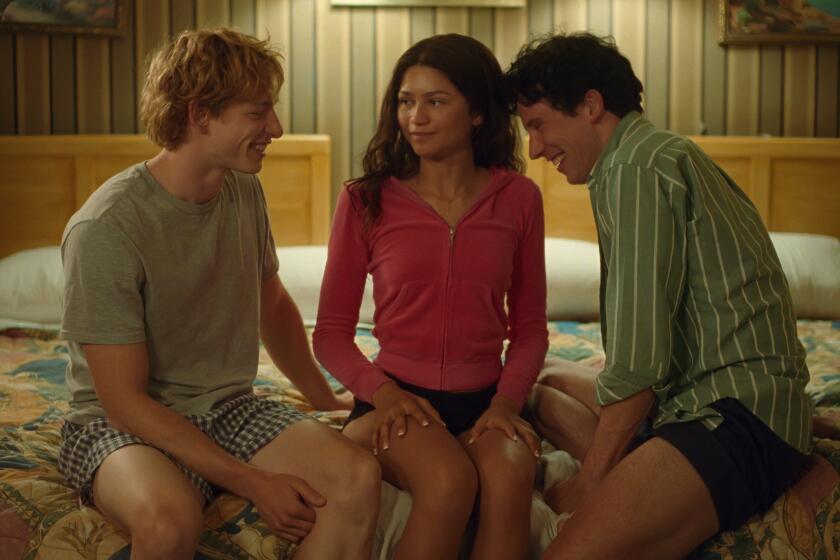STAGE REVIEW : FEW PLAY BY PIRANDELLO GAME ‘RULES’
It’s unfortunate that the bulk of the performances in the American Theatre Arts production of Luigi Pirandello’s “The Rules of the Game” are so bad that they virtually bludgeon the play out of sight in the mind’s eye. And it’s surprising too; from a design standpoint, the play has been thoughtfully produced.
“Rules of the Game” is very much in the modern European tradition of bitter battleground musings on the war of the sexes. And it’s a highly characteristic Pirandello work as well in its depiction of characters caught in the no-man’s land between actuality and the apparent.
When Leone tells Guido, who may or may not be his wife Silia’s lover (he is at the least a very attentive visitor), “You only see her the way she seems,” that’s true of all of them. Guido, ostensibly a man of action, does nothing when a trio of drunken soldiers burst in and rough Silia up. Leone, compulsively wrapped in philosophical reflection, turns out to be the cagiest and most pragmatic manipulator of them all when it comes to survival. And Silia, for all her temperamental extravagance, sexual allure and her power over men, confesses unhappiness at being a woman--except when it comes to making men suffer.
Part of Silia’s restlessness comes from being locked into Womanliness, where she’s temptress, wraith, wife, mistress, brat, matriarch--whatever male conception plays over her, like a roue’s measuring gaze. She’s a series of closed doors--even to herself--like so many of Pirandello’s other people, to whom the notion of identity is not only bottomless but insubstantial.
Director Don Eitner has set the play in the ‘30s, when fascism was on the rise in Italy and the characters’ dialectical confusions are a further expression of a social and political system that isn’t working anymore, and is losing its justification for being.
Leone, who has most of the conclusive lines, likes to tell everyone how important it is to follow one’s “concept,” and how his is one of airy renunciation. (“Love and hate,” he says to Silia at one point. “To save you, I had to disavow myself of those emotions. I had to abstract myself.”) But his renunciation of “the judgments and entanglements of a ridiculous world” is mixed with his indiscriminate embrace of it as he tells people that “I agree to everything.”
Leone seems to have an answer for everything, and everyone seems willing to mull over what he has to say. “Rules of the Game” isn’t as purely a theatrical expression of human enigma as “Six Characters in Search of an Author,” but it’s comfortably at home in the Continental mode where talk, if it’s provocative enough, doesn’t require much action. (William Murray’s translation is urbane without being facile.)
Pirandello’s surprise ending, where Leone’s self-interest turns from enlightened to diabolical, is a chilling alarm about the havoc self-absorbed people are capable of wreaking without the slightest damage to themselves.
Most of the performances are appalling, however. You have to extrapolate this play mentally while watching the players stumble through it. Donald May credits himself with 1,700 performances in “The Edge of Night,” and it’s the dead-eyed hollowness and inertia of the soap-acting style that ironically serves his Leone. But Tim Chic’s Guido is whiny-voiced and irresolute, in a way that doesn’t suggest cowardice (a trait attributed to Guido) as much as it does confusion about how to play the part. Carla Borelli’s Silia is plodding, graceless and shrill. Her affectations are so lurid that any sane visitor would shortly eye the door for a quick getaway.
It’s surprising how poorly observed this milieu is. Babbie Green’s Clara, the maid, doesn’t have the social deference a servant would have in this context (regardless of what the servant thinks of the employer). It’s characteristic of performances given in the loose, undisciplined, slouchy American posture. There’s nothing to suggest the Italian style.
Even the drunken soldiers are unconvincing. (When a drunk gets to the point where he falls down, it’s usually very hard for him to get back up again; not here--they bounce right up.) The sole exception is Michael Richardson’s Barelli. It’s a small role, but Richardson expresses the Latin temper and style of movement perfectly. It’s an exception that proves the rule.
The good set, lighting and sound are by Margaret Perry, Scott M. Stipetic and Warren Teel, respectively. The costume design, by Perry and Sonja Haney, is intermittent.
Performances Thursdays through Saturdays at 8 p.m., Sundays 2 p.m. at 6240 Hollywood Blvd., (213) 466-2462 or (213) 466-2463 TDD, through Aug. 24.
More to Read
The biggest entertainment stories
Get our big stories about Hollywood, film, television, music, arts, culture and more right in your inbox as soon as they publish.
You may occasionally receive promotional content from the Los Angeles Times.










